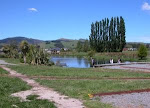This article provides some information for voters in the upcoming
local body elections about what Environment Canterbury does.
It is part of a series of four posts (linked below) that introduce the duties of the councils that we are voting for in this year's local body elections.
What does the city council do?
What do community boards do? and
What does Environment Canterbury do?
It is part of a series of four posts (linked below) that introduce the duties of the councils that we are voting for in this year's local body elections.
What does the city council do?
What do community boards do? and
What does Environment Canterbury do?
There are 20 district health boards across New Zealand and
they are there to set the overall strategic direction of health services in
their area and to monitor performance. They are required to plan and deliver health
services regionally, as well as in their own individual areas.
Their objectives include:
- Improving, promoting and protecting the health of people and communities
- Promoting the integration of health services, especially primary (eg doctors) and secondary care (eg hospitals) services
- Seeking to arrange the most effective and efficient delivery of health services to meet local, regional, and national needs
- Promoting effective care or support of those in need of personal health services or disability support.
- Helping people with disabilities to be independent, included and to participate in society
- Reducing health differences by improving health outcomes for Māori and other population groups
- Aiming to eliminate differences in health outcomes between various population groups.
- DHBs must show a sense of social responsibility, foster community participation in health improvement, and uphold the ethical and quality standards commonly expected of providers of services and public sector organisations.
Public hospitals are owned and funded by DHBs.



